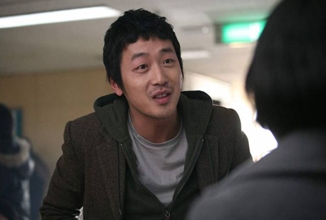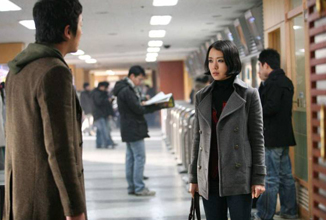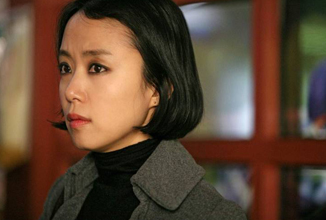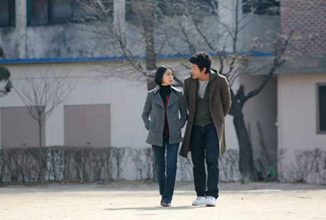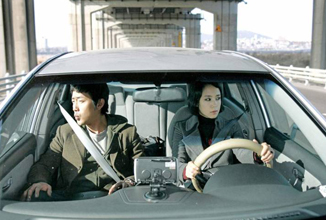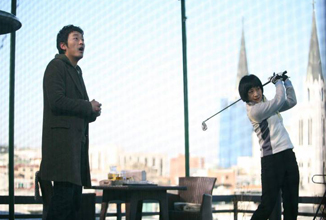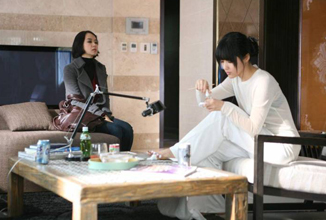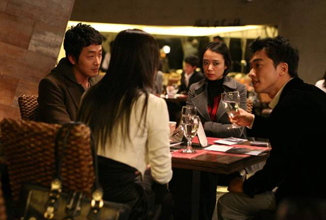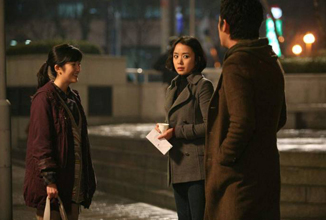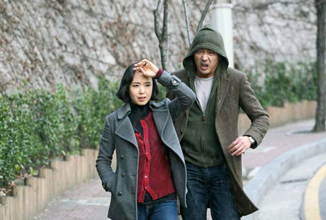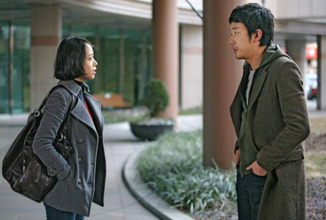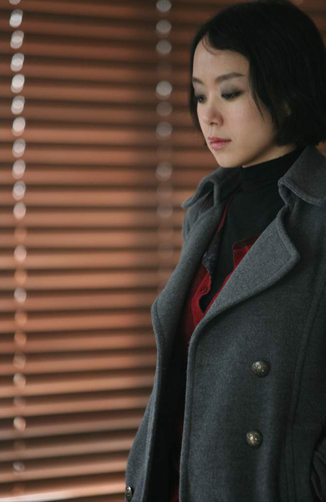
 |
|||||||||||||
Review: Though Hee-soo and Byung-woo's travels around Seoul form the hub of the storyline in My Dear Enemy, the film is much more character study than "road movie" and the journey which each of them takes is as much psychological as it is physical - especially in the case of Hee-soo. Though we are only given tantalising snippets of the circumstances which have pushed Hee-soo to finally seek out Byung-woo again, her unhappiness is written all over her face - with the subtlest of glances from Jeon Do-yeon speaking volumes without a single word needing to be spoken - and there is a palpable sense of desperation in her every word, gesture and action.
From the earliest stages of the film it is also blatantly clear that she is well aware of Byung-woo's charm and popularity "with the ladies", but is grimly determined not to let him get under her skin again - with a strong implication given that she, initially, believes a good deal of her current problems have stemmed from trusting him in the past. However, as she repeatedly watches his interactions with the various women they visit, she is forced to see him more as they do and her perceptions cannot fail to be affected, and gradually altered, as a direct result.
The journey also serves as a commentary on the differences in the lives of the "haves" and "have nots" in Korean (and, in fact, any) society and the idea that outlook on life, and how we choose to live, both play as much of a role in a person's happiness as circumstances (financial and otherwise) do, is repeatedly referenced throughout:
Direction: My Dear Enemy perfectly straddles the line between drama and romantic comedy - containing elements from each but remaining refreshingly different from either. Director Lee Yoon-ki (who also directed Ad Lib Night and This Charming Girl) is known for his ability to add layer upon layer to seemingly simple scenes and his work in My Dear Enemy is no exception. By ensuring that either Hee-soo or Byung-woo are always clearly in frame, our ability to see their (often incredibly subtle) reactions to passing comments, and the smallest of actions, results in every scene being totally gripping, with our perceptions of the unfolding drama changing in tandem with the main characters' perceptions of each other.
The humour present is never pushed or overplayed and is largely derived from empathy elicited for the incredibly likeable and well written main characters. Of Course, the success of this approach is dependent on the ability of both the director and cast, and thankfully all involved perform exquisitely - beautifully complimenting each other throughout.
Cast: Jeon Do-yeon is incredibly discerning in her choice of projects and this, combined with her prodigious acting talent, means that any film with which she chooses to be associated is necessary viewing for all fans of South Korean cinema. Her performance in My Dear Enemy once more shows why she has won so many awards in her career - an utterly faultless, nuanced and passionate portrayal.It could be said that Ha Jung-woo, as Byung-woo, has the most difficult role to play in My Dear Enemy, being required to give a performance with subtlety equalling that of Jeon Do-yeon's, while portraying a character of outward charm and confidence. He does so almost effortlessly and the noticeable chemistry between himself and Jeon Do-yeon adds yet more believability to both their portrayals.
Summary: DVD
DVD
Details: · Audio Commentary by Lee Yoon-ki, Ha Jung-woo, and Jeon Do-yeon
· Pre-production · Production Notes · Cast Interview · Poster Shoot · Premiere · Trailer
|
|||||||||||||
All images © Sponge and Bom Film Productions, CJ Venture Investment and Premier Entertainment Review © Paul Quinn |
|||||||||||||
